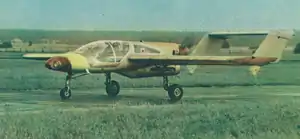PZL M-17
The PZL M-17 "Duduś Kudłacz" (initially EM-5A) was a Polish twin-boom pusher general aviation and trainer aircraft of 1977, which remained a prototype.
| PZL M-17 Duduś Kudłacz | |
|---|---|
 | |
| Role | General aviation aircraft |
| Manufacturer | PZL-Mielec |
| First flight | 7 July 1977 |
| Status | prototype |
| Primary user | Poland |
| Number built | 1 |
Design and development
The aircraft was an amateur design of a team of students of Warsaw University of Technology (Politechnika Warszawska) led by Edward Margański. It had quite unorthodox layout of a pusher with twin booms and very streamlined fuselage. A crew of two sat side by side, and had double controls. A tricycle landing gear was retractable.
The plane was designed in 1969-1971. At the design stage it was designated EM-5A (EM for Margański) and nicknamed Duduś Kudłacz (Hairy Duduś). The aircraft factory PZL-Mielec in Mielec got interested in the design and took over its development, under a designation PZL M-17. The design was modified there with help of Margański, plastic and duralumin construction was changed to riveted duralumin, and a less powerful engine.
The only prototype was flown on 7 July 1977 by S. Wasil. It was not produced in series. In 1979 the prototype was given to Rzeszów University of Technology. A shortcoming of a streamlined fuselage was a cramped cockpit, the crewmen were half-laying in a similar way, as in gliders.
The plane was a mid-wing monoplane. It had a two-blade wooden propeller and a fuel tank 310 l.
Specifications
Data from Jane's all the world's aircraft, 1975-76[1]
General characteristics
- Crew: 2
- Length: 6.5 m (21 ft 4 in)
- Wingspan: 9.2 m (30 ft 2 in)
- Height: 1.7 m (5 ft 7 in)
- Wing area: 11.3 m2 (122 sq ft)
- Aspect ratio: 7.5
- Airfoil: NACA 66-215
- Empty weight: 650 kg (1,433 lb)
- Gross weight: 900 kg (1,984 lb)
- Max takeoff weight: 1,050 kg (2,315 lb)
- Fuel capacity: 210 l (55 US gal; 46 imp gal)
- Powerplant: 1 × Avia M 137 6-cyl. inverted air-cooled in-line piston engine, 130 kW (180 hp)
- Propellers: 3-bladed controllable-pitch, 1.7 m (5 ft 7 in) diameter
Performance
- Maximum speed: 360 km/h (220 mph, 190 kn) at sea level
- Cruise speed: 250 km/h (160 mph, 130 kn) at 3,000 m (9,800 ft)
- Stall speed: 95 km/h (59 mph, 51 kn) flaps down
- Never exceed speed: 500 km/h (310 mph, 270 kn)
- Range: 600 km (370 mi, 320 nmi)
- Service ceiling: 6,500 m (21,300 ft)
- Rate of climb: 7.9 m/s (1,560 ft/min)
- Wing loading: 76.6 kg/m2 (15.7 lb/sq ft)
- Power/mass: 0.149 kW/kg (0.091 hp/lb)
References
- Taylor, John W.R., ed. (1975). Jane's all the world's aircraft, 1975-76 (66th annual ed.). New York: Franklin Watts Inc. p. 166. ISBN 978-0531032503.
- PZL M-17 at Poser site